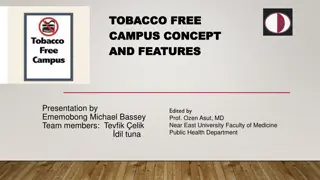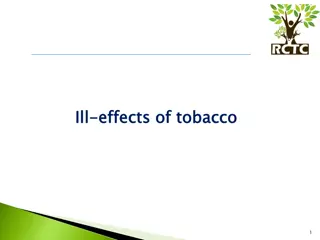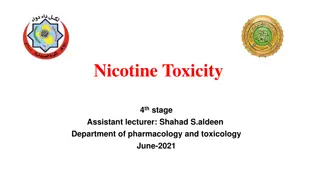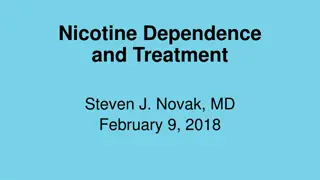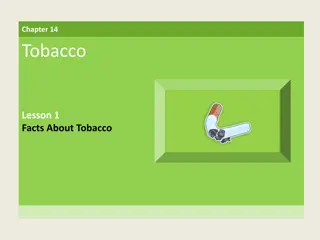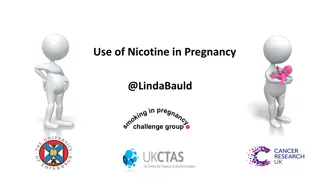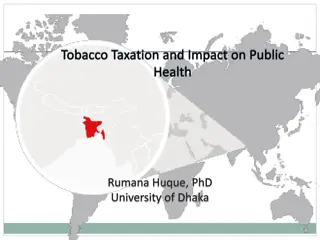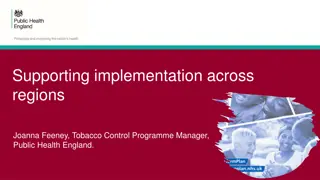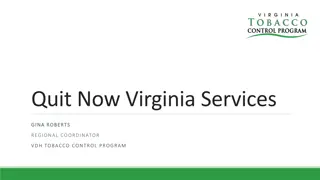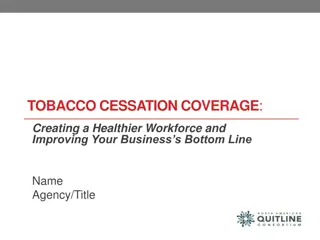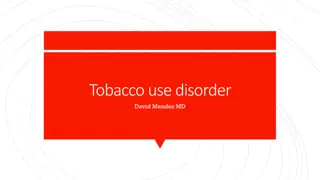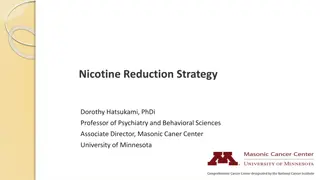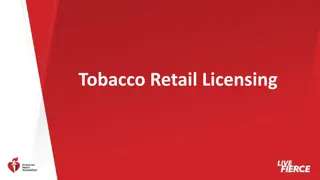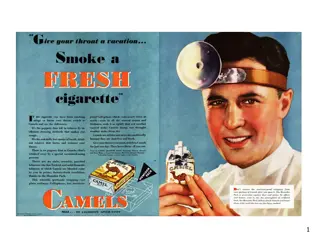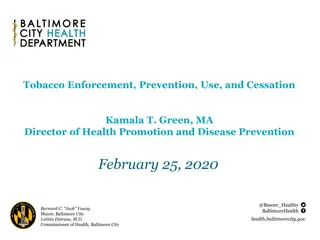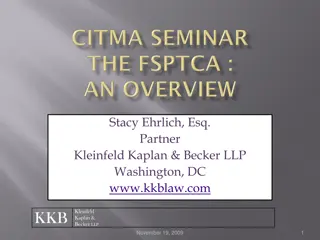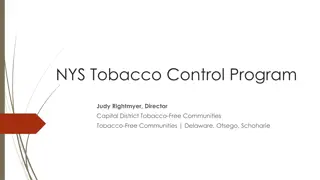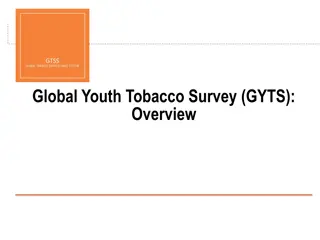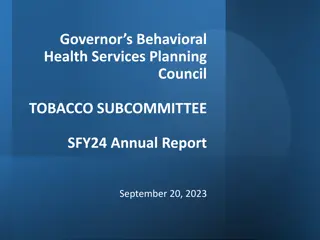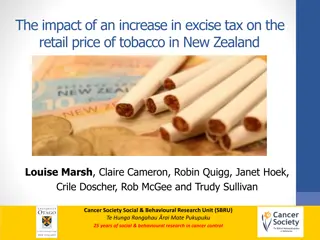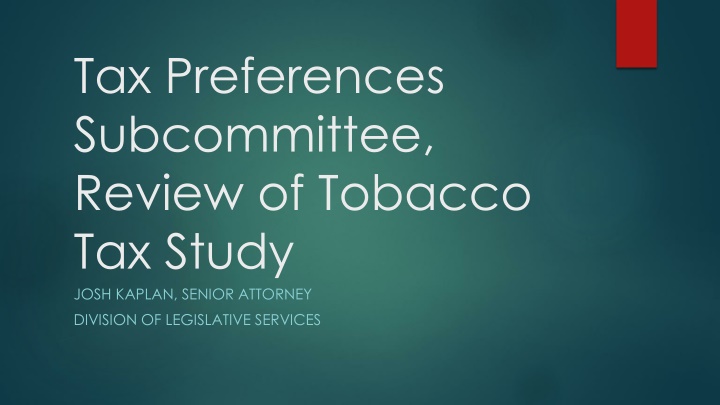
Virginia Tax Preferences Subcommittee Tobacco Tax Study Overview
Explore the history, powers, and prior activities of the Virginia Tax Preferences Subcommittee as they review tobacco tax policies and modernization efforts to reduce harm and ensure stable tax revenues. Learn about the subcommittee's establishment, responsibilities, and focus on evaluating tax preferences, including tobacco taxation reforms and technological advancements affecting harm reduction.
Download Presentation

Please find below an Image/Link to download the presentation.
The content on the website is provided AS IS for your information and personal use only. It may not be sold, licensed, or shared on other websites without obtaining consent from the author. If you encounter any issues during the download, it is possible that the publisher has removed the file from their server.
You are allowed to download the files provided on this website for personal or commercial use, subject to the condition that they are used lawfully. All files are the property of their respective owners.
The content on the website is provided AS IS for your information and personal use only. It may not be sold, licensed, or shared on other websites without obtaining consent from the author.
E N D
Presentation Transcript
Tax Preferences Subcommittee, Review of Tobacco Tax Study JOSH KAPLAN, SENIOR ATTORNEY DIVISION OF LEGISLATIVE SERVICES
Overview Topics to discuss: Overview of the subcommittee Its tobacco and nicotine tax study Budget/Code conflicts related to tax preferences
History of the Subcommittee The subcommittee was established by HB 777 (2012). Given broad authority to oversee the evaluation of Virginia's tax preferences, including but not limited to tax credits, deductions, subtractions, exemptions, and exclusions. Tax Preference not formally defined in Code. Generally the term means aspects of the tax code that treat certain people, activities, or types of income differently, often to promote a public policy purpose.
Powers of the Subcommittee The Joint Subcommittee shall have the following powers and duties ( 30-338): 1. Undertake a systematic review of Virginia's tax preferences; 2. Adopt a schedule for reviewing tax preferences based upon program areas to which the preferences relate; 3. Establish procedures and performance measures to evaluate the effectiveness of tax preferences; 4. Request that the Governor direct Department of Taxation staff conduct independent evaluations of tax preferences in promoting economic activity, generating revenue, or otherwise achieving their intended policy purpose and report the findings to the Joint Subcommittee; 5. Recommend a process and guidelines for establishing expiration dates for tax preferences; and 6. Submit an annual report to the General Assembly and the Governor of its recommendations, including which tax preferences should be continued, expanded, modified, or eliminated.
Prior Activity Broad Tax Policy 2017 Tax Cuts and Jobs Act, federal tax reform Wayfair decision (2018), sales tax collection from remote sellers Veterans Tax Benefits Ordinary income, retirement, real property Tax Credits Neighborhood Assistance, Historic Rehabilitation, Land Preservation Nonprofit Tax Exemptions Real property and sales tax See Preference reports, 2014-2016
Tobacco Tax Study Item 3-5.16, Appropriation Act The Joint Subcommittee to Evaluate Tax Preferences is hereby directed to continue studying options for the modernization of 58.1-1001(A), Code of Virginia, to reflect advances in science and technology in the area of tobacco harm reduction, and the role innovative non- combustible tobacco products can play in reducing harm, including products that produce vapor or aerosol from heating tobacco or liquid nicotine. In addition, the Joint Subcommittee shall study possible reforms to the taxation of tobacco products that will provide fairness and equity for all local governments and also ensure stable tax revenues for the Commonwealth. Three priorities: Modernize tobacco taxes to account for new technology and products, in order to reduce harm. Stable tax revenues for the Commonwealth. Equity for local governments
Tobacco Tax Study The balance between these two priorities of modernization/harm reduction and providing tax revenue have been the focus of the Subcommittee s work. Whether and how much to encourage vaping and other new products as an alternative to traditional cigarettes and tobacco products? How to tax these products consistently, on what basis, and at what rate? Across three meetings in 2018 and 2019, the Subcommittee heard testimony from both sides of the issue. 2019 legislation, SB 1371 (Norment), defined terms like liquid nicotine, heated tobacco product, and nicotine vapor product for first time No regulatory or tax policy was enacted.
Policy Changes-2020 First tax on liquid nicotine was imposed via the 2020 Appropriation Act. Rate of 6.6 cents/milliliter beginning July 1, 2020 Tax on tobacco products other than cigarettes was doubled. 2x rate provided by the Code Liquid nicotine tax was included in Governor Northam s proposed budget. Expanded tobacco products tax was added during session. Both were ultimately enacted in the Budget.
Policy Changes-2020 The Appropriation Act also increased the Cigarette Tax rate to 3 cents per stick. HB 785 (Watts) and SB 588 (Hanger) made significant reforms to local cigarette taxes. Before: Cities and Towns could tax at any rate. No county could impose a cigarette tax (Arlington and Fairfax excepted). After: Counties given equivalent taxing power to cities and towns. All localities capped at a rate of two cents per cigarette or the locality s rate before January 1, 2020.
Policy Changes-2024 Tax rate on liquid nicotine stayed at 6.6 cents/milliliter until July 2024. SB 582 (Ebbin)/HB 790 (Hope) (2024), imposed a licensing requirement and penalties on retailers for the sale of nicotine products to a person under 21. Codified rate of 6.6 cents on closed systems Created new rate of 10% of the wholesale price on open systems (ad valorem) 2024 Appropriation Act overrode these changes. For sales after July 1, 2024, all liquid nicotine subject to 11 cents per milliliter rate. Other tobacco products tax has remained at 2x rate provided by the Code.
Heated Cigarettes SB 1371 (2019) created an unintended issue by amending the definition of cigarette in the Code. A new category was created, heated tobacco products, which encompassed cigarettes which are intended to be heated and not burned. This created a compliance issue with the Master Settlement Agreement. HB 1099 (Kilgore) addressed this issue by reverting the definition of cigarette to what it was in 2019. Imposed a new rate of 2.25 cents per stick on heated cigarettes. The budget mirrored this rate and imposed a 20 percent wholesale tax on all other heated tobacco products.
Comparison with Other States States vary in their approach to nicotine taxes. The two most common approaches are per ml or based on wholesale price (ad valorem). Some states use a combination, or differentiate based on closed and open systems. Rates vary based on state and method. OH, WV, VA, NC, WI: 5-15 cents/ml CA, UT, CO, MN: 50-95 percent of wholesale price MD: 12% (open), 60% (closed), retail price
Wrap Up Despite significant legislative activity, nicotine and tobacco taxes continue to be an open issue. Basis of taxation, the proper rate, utility of various products are subject of ongoing debate.
Budget vs. Code Since 2020, nicotine and tobacco tax policy has frequently been set in the budget, overriding or supplementing code language. Other tax preferences have been enacted in this manner as well. This approach may reflect practical issues of timing and compromise in reaching agreement on the budget. However, there are implications as well. Budget language is effective only for the duration of the budget (up to two years and six months). Can lead to confusion as to which policy prevails. Questions of interpretation may arise.
Tax Preference as Budget Language 3-5.19 CIGARETTE TAX, TOBACCO PRODUCTS TAX AND TAX ON LIQUID NICOTINE B.1. Notwithstanding any other provision of law, the rates of the tobacco products tax imposed under 58.1-1021.02 of the Code of Virginia in effect on June 30, 2020 shall be doubled beginning July 1, 2020 for taxable sales or purchases occurring on and after such date. 2. Notwithstanding any other provision of law, the tobacco products tax imposed under 58.1-1021.02 of the Code of Virginia shall be imposed on any heated tobacco product at the rate of 2.25 cents per stick beginning January 1, 2021 for taxable sales or purchases occurring on and after such date, until July 1, 2024 for taxable sales or purchases occurring before such date. C.1. Notwithstanding any other provision of law, the tobacco products tax imposed under 58.1-1021.02 of the Code of Virginia shall be imposed on liquid nicotine, as defined in 58.1-1021.01 of the Code of Virginia, at the rate of $0.066 per milliliter beginning July 1, 2020 for taxable sales or purchases occurring on and after such date, until July 1, 2024 for taxable sales occurring before such date. 2. Notwithstanding any other provision of law, the tobacco products tax imposed under 58.1-1021.02 of the Code of Virginia shall be imposed on liquid nicotine, as defined in 58.1-1021.01 of the Code of Virginia, at the rate of $0.11 per milliliter beginning July 1, 2024 for taxable sales or purchases occurring on and after such date.
Enactment Clause attached to Budget, Amends Code 20. That 58.1-322.03 of the Code of Virginia is amended and reenacted as follows: 58.1-322.03. Virginia taxable income; deductions. In computing Virginia taxable income pursuant to 58.1-322, there shall be deducted from Virginia adjusted gross income as defined in 58.1- 321 (iii) for taxable years beginning on and after January 1, 2022, but before January 1, 2024, $8,000 for single individuals and $16,000 for married persons (one-half of such amounts in the case of a married individual filing a separate return); and (iv) for taxable years beginning on and after January 1, 2024, but before January 1, 2026, $8,500 for single individuals and $17,000 for married persons (one-half of such amounts in the case of a married individual filing a separate return). For purposes of this section, any person who may be claimed as a dependent on another taxpayer's return for the taxable year may compute the deduction only with respect to earned income.
Grocery tax HB 90, McNamara (2022) eliminated the state share of the tax on groceries, leaving the local one percent local share intact. 58.1-611.1 requires that an amount equivalent to the state share of the grocery tax be distributed to localities on a per pupil basis. Continued authorization in the budget will be required to continue distribution of these funds. 2024 Appropriation Act: Supplemental Payment in Lieu of Sales Tax on Food and Personal Hygiene Products: FY 25: $272,500,000, FY 26: $273,600,000

